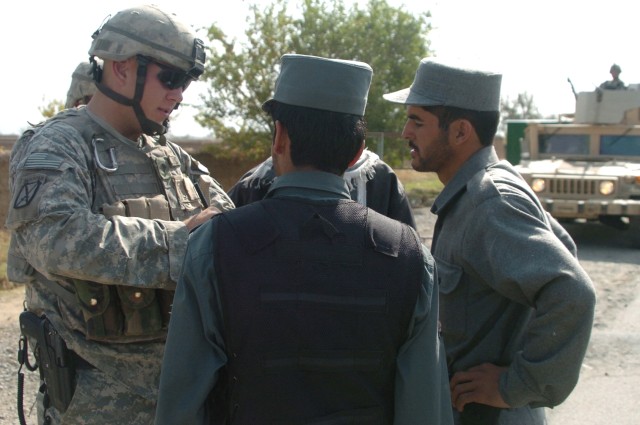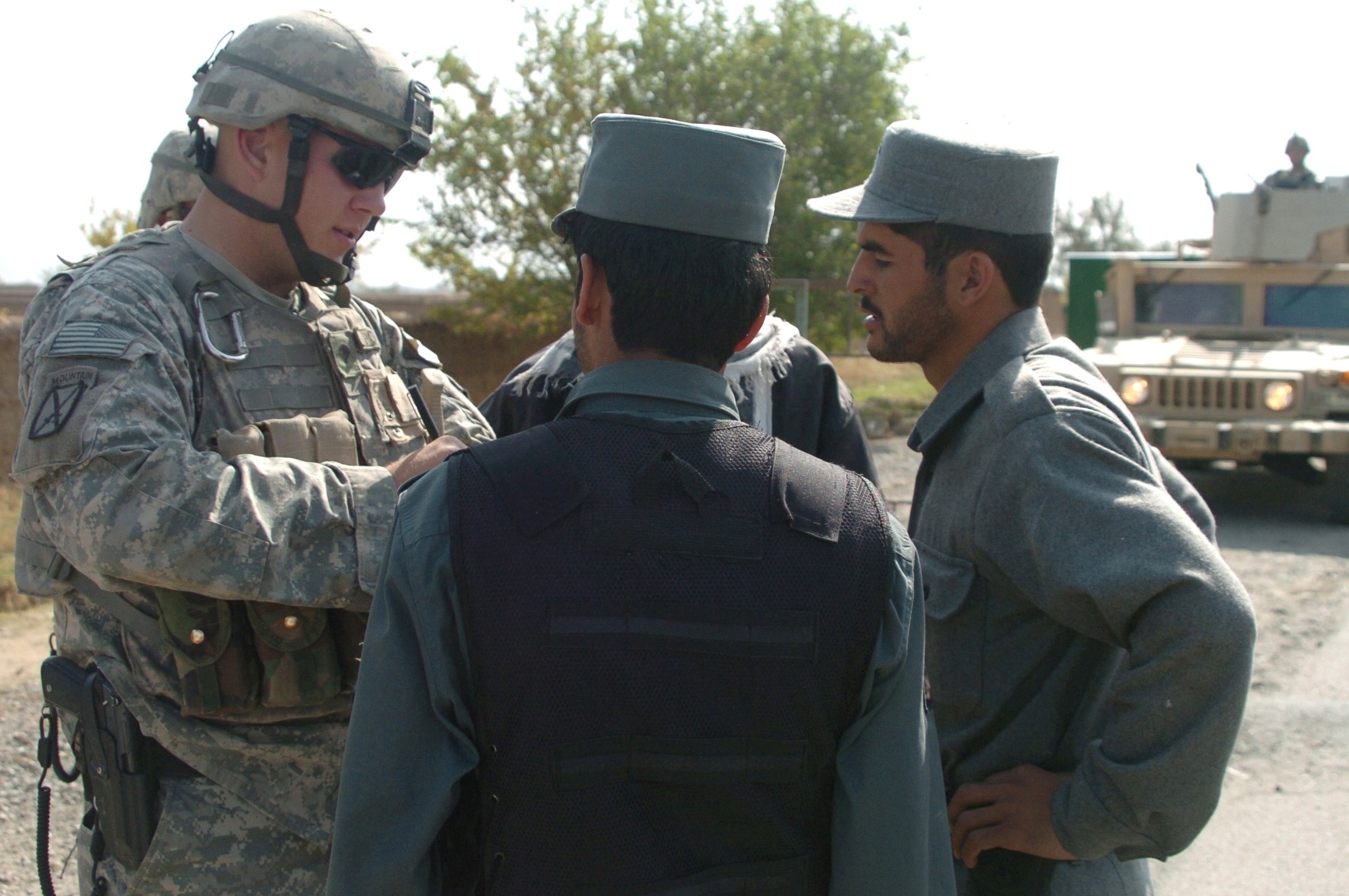WASHINGTON (American Forces Press Service, Feb. 11, 2007) - It will take more troops to conduct a combination of security and stability operations to end fighting in Afghanistan, Gen. Bantz J. Craddock, NATO's supreme allied commander in Europe said in Munich, Germany yesterday.
Coalition forces are "well postured" to deal with Taliban remnants in southern Afghanistan and help spread good governance there, Lt. Gen. Karl Eikenberry, the former commander of Combined Forces Command Afghanistan said today on CNN's "Late Edition with Wolf Blitzer."
<b>Craddock's Assessment</b>
To succeed, Craddock said, "you must clear, you must hold, you must build."
Craddock spoke to reporters here at the start of the 43rd Munich Security Policy Conference. The annual international conference followed two days of informal NATO defense ministerial talks in Seville, Spain, where the force level of the NATO-led mission in Afghanistan was a prime topic.
While the NATO meetings were not "a force-generation conference," Craddock said he was able to present his assessment of the Afghanistan situation and have "forthright, candid and fruitful" dialogue.
NATO's International Security Assistance Force needs "full sourcing" to provide the security level international "builders" need to provide the long-term, economic investment that will create jobs and, ultimately, stability, Craddock said.
Until then, fighting will continue, since the Taliban has an enormous recruiting ground for foot soldiers among the 2 million Afghan refugees in Pakistan, he said. Most of these refugees have no ideological ties, he said. They become Taliban soldiers to earn a wage to live.
"They feel there are no opportunities in life and they're looking for a way to feed their children or put a roof over their families' heads," Craddock said. "The key is driving a wedge between the foot soldiers and the hard core ideologues, the diehard extremists who will never change."
The international community can create a "wedge," he said, by creating jobs, providing social services, and building hospitals and schools for Afghan children.
Craddock said he has made two trips to Afghanistan since replacing Gen. James L. Jones in December as commander at Supreme Headquarters Allied Forces in Europe. He said he came away from both trips encouraged by the progress he saw.
"I would be the first to admit there's much to be done," he said. "There are challenges. There are problems." But, he added, the comprehensive approach of concurrently employing military operations along with reconstruction and development operations is underway and moving forward.
Based on a review of the mission requirements, NATO officials have determined more troops are need for the dual-pronged approach. While acknowledging that more forces are needed in Afghanistan, Craddock would not provide numbers, which he said are operational in nature.
Earlier this week, Craddock released a combined joint statement of requirements on what's needed for the fight in Afghanistan in terms of troop levels, equipment and support personnel. NATO's ministers and chiefs of defense are being asked to review the requirements to see what each country could contribute.
NATO last reviewed the mission requirements 13 months ago, he said, and conditions have changed since then, he said.
"We do a great job of planning," Craddock said. "We don't do a great job at monitoring current, day to day activities, and reassessing and adjusting and revising where necessary to face the reality that the world changes."
Craddock thought it was essential to validate the original force level needed to meet the mission requirements and pointed out that those forces were never fully provided. "We never received all the forces that we deemed necessary to accomplish the mission required," he said.
"I broke it into three categories: priorities needed that have yet to be filled; new requirements; and revisions necessary," he said. "Over the period of time ISAF had operated, we've made adjustments and we've changed and operated so we had a better insight for what's needed for the future."
Since the mission in Afghanistan began, NATO progressively assumed responsibility for the country south, east and then all of Afghanistan.
There also have been new developments with regard to movement along the porous border with Pakistan. Craddock said he met with Pakistani officials two weeks ago to discuss better border control.
"They have to step up and play a greater role in the control of their border with Afghanistan," he said. "I received indications that they do feel that there is inadequate control, and they told me they're taking measures to address this and to provide greater control."
Right now, Craddock said, ISAF has the ability is to work security aspects throughout the country, particularly in the southeast where the security is less than in the north and west. "That's where the Taliban come in; that's the heartland and the homeland," he said.
What's needed, he said, is adequate numbers of troops to provide security and, at the same time, implement the stability operations, the "quick-impact projects" such as building schools and installing roads.
"Right now, the commanders are finding that, without adequate forces available, they have to move from one to the other, and they're continually shifting around," he said.
Once ISAF forces leave an area, the Taliban moves back in. "You must maintain presence, and with presence, the Taliban does not come back in," Craddock stressed.
Moving troops around to do both security and stability, he said limits flexibility, he said. "And it is causing us to have to retake lost ground."
Given a generous contribution by the United States, an additional contribution by the United Kingdom, and the current security situation, he said, "There are adequate forces right now to effect security. There are not adequate forces to do the other things that need to be done concurrently."
Craddock said ISAF is doing an excellent job on such quick-return projects as fixing problems in local communities. What's missing is the long-term investment and development of jobs and infrastructure.
This work must be "pushed out to the provincial governors, to the tribal elders," he said. "They are the ones who know what has to happen and what their priorities in terms of delivering these services and this infrastructure to the people."
<b>Eikenberry's Assessment</b>
"There has been a problem with the reconstitution of Taliban command and control, that does enjoy sanctuary and does enjoy safe haven in southern Afghanistan," Eikenberry said. "Against that, ... we're very well postured for success."
In September 2001, 90 percent of Afghanistan was under Taliban control, he said. "That regime has been toppled," he said. "There's been enormous pressure that has been put against the network."
Eikenberry, who spent 21 months commanding coalition forces in Afghanistan, said there is definitely going to be more fighting in southern Afghanistan as the Taliban tries to challenge the expansion of NATO forces there. "We expect the Taliban will surge, but NATO military presence is stronger than ever," he said.
He said he was heartened by the increase of the Afghan military's combat power and the growing influence of the Afghan government into ungoverned areas.
"There's no place in Afghanistan today -- six years into this campaign -- there's no place Taliban extremists have been able to enter that has already (been) secured by the government of Afghanistan," he said. "It's very much a matter of ungoverned space, and this has got to be understood by all of us."
Eikenberry explained that Taliban activity is likely to increase as the weather improves in the spring, but NATO forces are prepared "to preempt Taliban efforts," he said.
Osama bin Laden is probably still alive, but the general emphasized the war on terror is about more than just bin Laden. "The war against international terror is not about one individual," Eikenberry said. "Global terrorism is a phenomena which has many leaderships nodes. It has financing nodes, it has training facilities, and it also generated recruits."
Even so, the search for bin Laden will continue, he said. "This man has committed mass crimes and atrocities against the American people, and our military will not rest until that man is found, captured or killed," he said.
Eikenberry also talked about Iran's influence in Afghanistan. He said there is no direct evidence that Iran is giving equipment or weapons to the Taliban, but Iranian security organizations do maintain contacts with the Taliban. Iran probably helps finance and train Taliban fighters, he said.
The Shiite dominated Iranian government does not want a return of Sunni Taliban extremism in neighboring Afghanistan, he said.
"However, they (Iran) may be hedging their bets and maintaining tactical kinds of alliances with extremists in Afghanistan," he said. "It would be a hedged strategy, in case we should have more tension or conflict with Iran."


Social Sharing